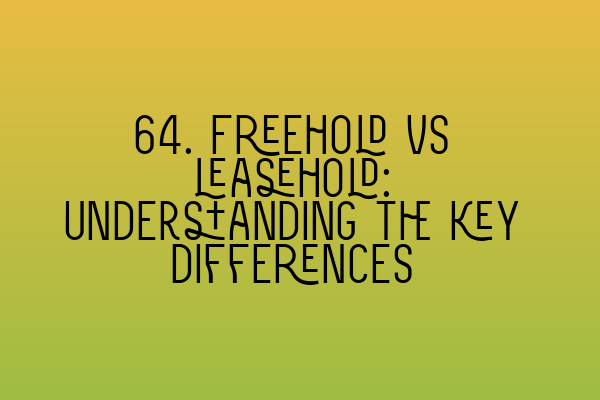64. Freehold vs leasehold: Understanding the key differences
As you navigate the world of property law, it’s crucial to comprehend the fundamental distinctions between freehold and leasehold ownership. Whether you’re a first-time buyer, an investor, or a legal professional, understanding these key differences is essential to make informed decisions regarding property transactions. In this article, we will explore the differences between freehold and leasehold, outlining their characteristics, rights, and obligations.
Freehold Ownership: Complete Ownership, Absolute Control
Freehold ownership represents the most comprehensive form of property ownership. When you own a freehold property, you have complete ownership and control over both the property and the land it stands on. It grants you the undivided rights and responsibilities associated with the land and the buildings on it. This means that you have no restrictions on the use, occupation, or development of the property, within the boundaries of the law.
One of the key advantages of freehold ownership is that it is a long-term investment with potential value appreciation. As a freeholder, you have the freedom to sell, let, or alter the property without requiring permission from anyone else.
Leasehold Ownership: Rights and Obligations within a Defined Period
Leasehold ownership, on the other hand, grants a person the right to occupy and use a property for a fixed period of time, as specified in the lease agreement. In leasehold ownership, the land is owned by a separate entity known as the freeholder or landlord. As the leaseholder, you effectively rent the property from the freeholder for the duration of the lease.
Leasehold ownership typically involves an ongoing financial commitment in the form of ground rent and service charges that contribute towards the maintenance and management of the property. Furthermore, leasehold properties are subject to certain restrictions, such as seeking permission from the freeholder to make significant alterations to the property or subletting it.
Understanding the Key Differences
Ownership Duration: The key difference between freehold and leasehold ownership lies in the duration. Freehold ownership offers indefinite ownership, whereas leasehold ownership is limited to a specified period stated in the lease agreement.
Control and Restrictions: Freehold ownership provides the utmost control and freedom over the property, with no significant restrictions on its use or alteration. In contrast, leasehold ownership comes with certain limitations and conditions imposed by the freeholder.
Responsibility for Maintenance: As a freeholder, you are solely responsible for the maintenance and repair of the property. In leasehold ownership, the landlord or freeholder often retains the responsibility for the overall maintenance and repair of the building, while the leaseholder contributes through ground rent and service charges.
Other Considerations: When considering a leasehold property, it’s important to assess the length of the lease, the ground rent costs, service charges, and any potential restrictions outlined in the lease agreement. It is recommended to seek legal advice to understand your rights and obligations fully.
Making Informed Decisions
When it comes to property ownership, whether freehold or leasehold, it is crucial to make informed decisions based on a clear understanding of the options available.
At SQE Property Law & Land Law, we provide comprehensive legal advice and guidance to help you navigate the complexities of property transactions. Our team of experienced solicitors can assist you in understanding the key differences between freehold and leasehold ownership, ensuring you are well-equipped to make informed decisions.
If you are preparing for SQE exams, we offer SQE 1 and SQE 2 preparation courses to help you ace the exams. In addition, our practice exam questions and mock quizzes can enhance your SQE 1 preparation, enabling you to perform at your best on exam day. Stay updated on the latest SRA SQE exam dates to plan your preparation effectively.
Remember, understanding the differences between freehold and leasehold is essential to make sound property decisions. Whether you are considering buying a property, leasing it out, or advising clients on property matters, having a solid understanding of these concepts will help you navigate the property law landscape with confidence.
At SQE Property Law & Land Law, we are here to support you every step of the way. Contact us today to learn more about our services and how we can assist you in your property law journey.
Related Articles:
– SQE 1 Practice Exam Questions
– SQE 1 Practice Mocks FLK1 FLK2
– SQE 2 Preparation Courses
– SQE 1 Preparation Courses
– SRA SQE Exam Dates
